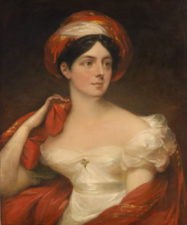On 26 March 1716 Lady Mary Wortley Montagu’s satirical mock-eclogues “Monday”, “Thursday”, and “Friday” were illicitly printed by the notorious Edmund Curll under the title of Court Poems. This therefore seems as good a day as any for remembering Montagu, especially since the date of her birth in 1689 (as opposed to that of her baptism) remains unknown. She was a woman of extremes and paradoxes – both celebrated and vilified, privileged and discriminated against, an ambitious writer who denied that she ever sought fame or even to appear in print. As an author she is among the greats, and yet the writings that survive are few compared with those that are known to have been destroyed (a life-long diary, a “history of her own times”, and whole correspondences, some of them with members of the European intelligentsia). Her literary fame, too, is eclipsed by her introduction into western medicine of inoculation against smallpox: the first use by western doctors (who had, in scientific terms, no idea what they were doing) of tiny quantities of a virus to provoke the human body to manufacture antibodies and thus to secure future immunity from the disease.
Lady Mary was a celebrity during the early part of her life: as a rich nobleman’s beautiful daughter, as a young woman who signalled rebellion by eloping, as a wit and beauty and rising courtier, as an Englishwoman who had travelled through the Ottoman Empire and visited the fabulous harems of Constantinople. As the introducer of inoculation she polarized opinion, being seen by many as a saviour, a benefactor to the human race, but by others as virtually a mass murderer.
Curll published only half of her eclogues; in total they amounted to six, one for every day of the week except Sunday. When this happened Montagu had recently recovered from smallpox. She had survived (though at the critical point of her illness the gossips said she was dying) but she was badly scarred, and faced the collapse of her promising career at the courts of both George I and the Prince of Wales, the future George II. The first of the three poems now offered to the public, “Monday”, was generally taken to be hostile to Caroline Princess of Wales. In fact it is a diatribe against the princess set in the mouth of an unsympathetic speaker who is prudish but overdressed, rigidly pious but willing to compromise her principles for the sake of ambition, eager to censor avant-garde literary works which she cannot understand. So “Monday” has the comic force of a political cartoon, while “Tuesday” (not published until later) showcases the rivalry between fashionable, predatory young men to whom women are scalps or trophies – or rather ladies, not women, since the social rank of their conquests is an important factor in the competition. It is in this poem that Montagu allows her gaze to slip for a moment from the “happier sinners” of the upper classes, both male and female, to the “tattered riding-hoods” out in the streets who are paying the price for sin at a lower stratum.
From this is can be seen as poet, political commentator, and medical pioneer Montagu touched life at an unusual number of different points. The electronic encoding in Orlando: Women’s Writing in the British Isles from the Beginnings to the Present brings up her name and her activities in many different contexts, many different searches. A tag search for the Genre: Medical Writing brings up (between Sarah Stone’s midwifery case-histories and Sophia Hume’s medical-theological diatribe against smallpox inoculation) a passage about Montagu’s letters from Turkey, which were published after her death. This passage is there because one of the letters “admiringly describes, in careful empirical detail, the eastern medical practice of inoculation against smallpox, and declares her intention of one day introducing it to England.”
If you search the Orlando tags for Genre: Fairytale you will find (between Jane Wiseman’s A Fairy Tale Inscrib’d to the Honourable Mrs. W––, with Other Poems and the inset fairy stories in Sarah Fielding’s The Governess) a mention of Montagu’s multi-generic prose fiction “La Princesse Docile” or “Princess Docile”. The much more numerous results of a search on Genre: Diary reveal (between Elisabeth Wast’s Memoirs; or, Spiritual Exercises and Frances Seymour, Lady Hertford’s “fragmentary political journal”) the sorrowful story of how Montagu’s early diary was burned by her sister when she eloped, and a further fifty years’-worth was burned by her daughter after she died, each acting on the best of motives.
Users of Orlando may come on the story of Curll’s printing of Montagu’s eclogues by several different routes. A number of different Genre searches lead to them: those for Eclogues, Mock Forms, Poetry, and Satire. Another way to locate them is to run a chronological search on Edmund Curll, which will show that in the decade he published Montagu’s poems he also published Jane Barker, Delarivier Manley, Susanna Centlivre, and Sarah Butler (the remarkable Irish writer of tales based on history written in the Irish tongue about a century before her), as well as risqué works on masturbation, the hoop-petticoat, and ladies’ fashions generally. These results demonstrate how Curll’s interest in the highly marketable led him both towards sexually suggestive material and towards writings by women.
A search on “Mode of Publication: Pirated” produces results which overlap here and there with those of the search on Curll, as it situates Montagu’s eclogues among works issued without authorial consent which were written by Katherine Philips, Jane Barker, Mary Lady Chudleigh, Delarivier Manley, Mary Davys, Catharine Trotter, Elizabeth Singer Rowe, Eliza Haywood, and Samuel Richardson (who published Sir Charles Grandison in a race with an unauthorised Dublin printer).
These search results also show that Curll was not the only offender against Montagu’s authorial rights (if such rights had existed in her day, which they did not). The notorious Verses Address’d to the Imitator of Horace (the most clever and the most virulent of all the printed attacks on Alexander Pope), which was most probably written as a collaboration between herself and her friend Lord Hervey, appeared anonymously in two different editions from two different publishers on the same day. Perhaps one of the two collaborators got it printed behind the back of the other; perhaps someone who had been shown it in secret could not resist making it public. But the most likely is that Pope himself arranged the publication of this hurtful attack in the expectation that it would garner sympathy for him, disgust at his attackers, and permission for him to sink to new lows in the kind of stuff he threw back at them.
Montagu’s Letters Written During Her Travels (her “Embassy Letters”), too, were illicitly published, but in this case she seems to have plotted the outcome. Having carried the manuscript of her travel book around more than a dozen European domiciles during twenty years of her later life, she left it, before her last crossing of the Channel back to England, with an English clergyman who ministered to an expatriate community in Rotterdam. She left an inscription on the manuscript saying that he was to do with it what he though fit – she must have had publication in mind, but she knew how much the publicity would displease her family: her son-in-law Lord Bute, who was currently Prime Minister and violently unpopular, and her daughter, a dutiful wife who also loved her husband. In due course (after his mother-in-law’s death) Bute did indeed offer the Rotterdam clergyman money for the manuscript. But he came too late to destroy or suppress it. Two young Englishmen on the Grand Tour had visited the clergyman and been shown the manuscript travels. They asked to borrow it overnight and they worked furiously at transcribing. One of them was a publisher’s son. Thus were Montagu’s Embassy Letters pirated, and she would almost certainly have been the first to applaud.
The other piracies turned up by the same Orlando search are a richly varied bunch. Sometimes it is doubtful whether or not the author gave her consent. Sometimes she vehemently denied that she had consented, but later scholars find her difficult to believe. The results as a whole constitute a salutary reminder that eighteenth-century printing practices were not those of today’s printed book trade, and that we need to be cautious in assuming any correspondence for women of that era between reaching print and either self-expression or autonomy. Understanding of women’s literary history is advancing fast, but it remains a challenge to tease out these often intricate intersections of gender convention with market practice.
This information is provided by Dr Isobel Grundy, University of Alberta, and comes from Orlando: Women’s Writing in the British Isles from the Beginnings to the Present, Cambridge University Press, by subscription: see http://orlando.cambridge.org.

